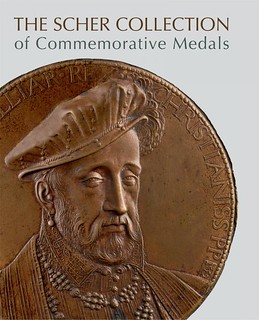
PREV ARTICLE
NEXT ARTICLE
FULL ISSUE
PREV FULL ISSUE
NEW BOOK: THE SCHER COLLECTIONEarlier this year a new book based on the Scher Collection of commemorative medals was published by The Frick Collection. -Editor
Portrait medals were developed during the Italian Renaissance and are central to the history of European portraiture, flourishing as an art form through the nineteenth century and into the twentieth century. Though less familiar to us now than painting and sculpture, these exquisitely crafted objects, typically made from lead, bronze, silver, or gold, were produced (sometimes in large numbers) to commemorate individuals, to acknowledge special events, and to disseminate the identity and power of their sitters. The study of the portrait medal has become, through& the work of Stephen Scher and others, a burgeoning area of scholarship. Excellent reproductions of all medals at actual size, with details of obverse, reverse, and full captions, are accompanied by scholarly essays, notable facts, and historical references in this important new volume. Authors: Edited by Stephen K. Scher with the assistance of Aimee Ng, with essays by Christopher Eimer, Martin Hirsch, Mark Jones, Jan Pelsdonk, Marie-Astrid Pelsdonk, Ulrich Pfisterer, and Stephen K. Scher; entries by Walter Cupperi, Alessandra Di Croce, Arne Flaten, Emma Merkling, Carolyn Miner, Aimee Ng, Marie-Astrid Pelsdonk, and Stephen K. Scher; and artist biographies by Emma Merkling, Stephen K. Scher, and Davide Stefanacci 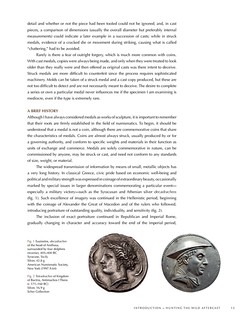 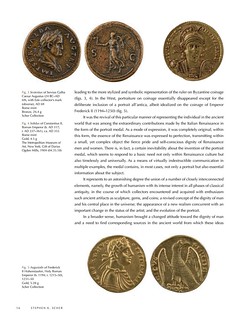 Publisher: The Frick Collection in association with D Giles Limited Hardcover, 9 x 12 in., 656 pages, 1842 color illustrations Price:$280.00
For more information, or to order, see:
A nice review of the book by David Masello was published October 9, 2019 in Sculpture magazine. Here's an excerpt. -Editor Sculpture portable enough to fit in the palm of your hand, inside a pocket, or tucked into a wallet can also be invested with enough narrative power to tell an epic story. The newly published catalogue, The Scher Collection of Commemorative Medals, proves that sculpture the size of a silver dollar can assume the presence of something monumental. The first example of such portable power was likely cast around 1438, in Italy. On a roughly four-inch-diameter lead disk, the artist known as Pisanello sculpted a two-sided portrait of a Holy Roman Emperor. Pisanello's work, like all subsequent portrait medals, was both commemorative and sculptural. Dr. Stephen Scher, the owner of the 884 objects illustrated in actual size in this epically weighted (and priced) volume, admits to being afflicted since childhood with "the collector's disease." During his 60 years amassing portrait medals, he has emerged as the world's most prolific collector of the art form. As any museum director might remark upon receiving a bequest of this scale, Ian Wardropper, director of the Frick Collection, happily writes in the foreword that of this "greatest medal collection in private hands…a significant portion of it has very generously come to the Frick as an initial and promised gift." 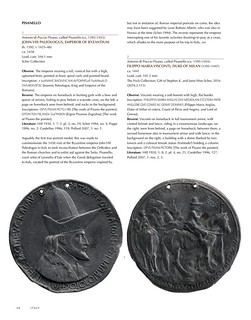 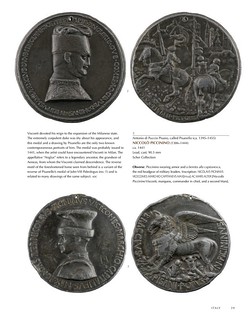 In presenting the case for portrait medals as sculpture, Scher and the other scholars who have contributed to the book come across as slightly defensive but ultimately convincing. "Although I have always considered medals as works of sculpture," Scher writes in his introduction, "it is important to remember that their roots are firmly established in the field of numismatics. A medal is not a coin." He goes on to explain that coins, unlike the treasures he has collected from Italy, Germany, France, England, Scandinavia, Switzerland, Mexico, and the United States, are always "struck," whereby an image is pressed onto and into a blank metal form. Money is issued by a governing agency. While coins "conform to specific weights and materials in their function as units of exchange and commerce," Scher emphasizes, "medals are solely commemorative in nature, can be commissioned by anyone, may be struck or cast, and need not conform to any standards of size, weight, or material." And just in case the matter of sculpture versus currency is still in doubt, Wardropper adds that "Steve's rigorous scholarship over the years has done much to establish medals—traditionally considered closer to numismatics than to fine art—as small-scale sculptures deserving of a prominent place in the history of art." Once the Scher collection is housed at the Frick, the institution will likely become one of the world's largest repositories of the art form. To read the complete article, see:
To read an earlier E-Sylum article about a related exhibit catalog, see:
Wayne Homren, Editor The Numismatic Bibliomania Society is a non-profit organization promoting numismatic literature. See our web site at coinbooks.org. To submit items for publication in The E-Sylum, write to the Editor at this address: whomren@gmail.com To subscribe go to: https://my.binhost.com/lists/listinfo/esylum All Rights Reserved. NBS Home Page Contact the NBS webmaster 
|
